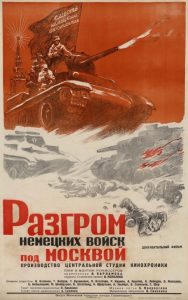
‘Moscow Strikes Back,’ Front-Line Camera Men’s Story of Russian Attack, Is Seen at the Globe
T.S. Aug. 17, 1942
Out of the great Winter counter-offensive that began on Dec. 6 of last year on the approaches to Moscow, Russian front-line cameramen have brought a film that will live in the archives of our time. “Moscow Strikes Back,” now at the Globe, is not a film to be described in ordinary reviewer’s terms, for these events were not staged before a camera and artistically arranged; they were recorded amidst a struggle that knew no quarter. Yet, here is a film to knot the fist and seize the heart with anger, a film that stings like a slap in the face of complacence, a scourge and lash against the delusion that there may still be an easy way out. Here is a film to lift the spirit with the courage of a people who have gone all-out. Among the documents of great battles—we did not witness Stallings’s “The First World War”—we have not seen a film to equal it.For this is a record of things that the impartial eye of the camera can tell best and words but inadequately describe. The grief, the hope and determination of these faces at work and in desperate battle are not easily reduced to a phrase. Nor can one readily define the transition of a people into the deepest necessities of total war. The festive marchers blithely parading across Red Square in a great sports demonstration are the same who on another day stand in massed ranks before Lenin’s tomb to hear Marshal Timoshenko’s warning to be ready for battle. They are the same who on Nov. 7, four months after the Nazi invasion, stand grimly in the snowy expanse of the square listening to Stalin’s speech before moving in tank and truck or afoot directly from the parade ground for the fighting front. A change, deep and visible, has occurred between those three assemblies, and the camera tells it.Here is the preparation for the counter-stroke while in Moscow the old men and women and children build sandbag barricades and streetcars pass the muzzles of cannon commanding the avenues; here are the people who said: “If we are defeated or the outskirts we will stop them in the streets.” Here are the attack and the succeeding attacks as white-clad soldiers and parachutists charge into villages past shell-bursts and burning tanks or take-cities street by street, ferreting sullen Germans from cellars and foxholes. Here are the littered vehicles and cannon and tanks of the German retreat.The savagery of that retreat is a spectacle to stun the mind. The villages are not villages but charred honeycombs of little low walls that once were houses, schools, or even cathedrals. But infinitely more terrible are the charnel heaps of twisted grotesques that no longer resemble human beings, the naked and slaughtered children stretched out in ghastly rows, the youths dangling limply in the cold from gallows that were rickety, but strong enough. Among them wander the living mothers, their faces set in friezes of grief, and sometimes a Red Army soldier gazing on the broken bodies with a silence like flame. The Germans called it policy. They also had another word: “Shrecklichkeit.”To say that “Moscow Strikes Back” is a great film is to fall into inappropriate cliché. As a documentary it has been brilliantly edited by Slavko Vorkapich, tersely written by Albert Maltz and movingly spoken by Edward G. Robinson, but that does not tell the story of what the heroic cameramen have done. Amid the fury of battle they have caught and arrested for the embattled peoples of these years the greatness of effort, the sheer greatness of heart of the people that stopped the Wehrmacht’s panzers on that fateful day of Dec. 6 and closed the gates of Moscow to the Nazi tide. What that moment meant in the strategy of nations history alone will tell, but what it meant in terms of human beings rising to a tremendous climax of sacrifice and blood and heroism “Moscow Strikes Back” has told overwhelmingly and irrevocably for all time to come.
MOSCOW STRIKES BACK; a feature-length Russian documentary produced by the Central Studios, Moscow, USSR; English commentary by Albert Maltz, narrated by Edward G. Robinson; editing and montage by Slavko Vorkapich; musical score arranged by Dimitri Tiomkin; released here through Artkino Pictures, Inc. At the Globe Theatre 1 October 1942
“Разгром немецких войск под Москвой”
Выпущен в советский прокат 18 февраля 1942 года.
(«Правда», 19 февраля 1942 года. Огромный успех нового фильма.)
Argentina – 29 September 1942
USA – 1 October 1942
Mexico – 15 January 1943
Belgium – 20 January 1945
Denmark – 8 October 1945
Czechia – 2 April 2005 (Febio Film Festival)
| ФИЛЬМОГРАФИЯ ОТЕЧЕСТВЕННЫХ ФИЛЬМОВ |



